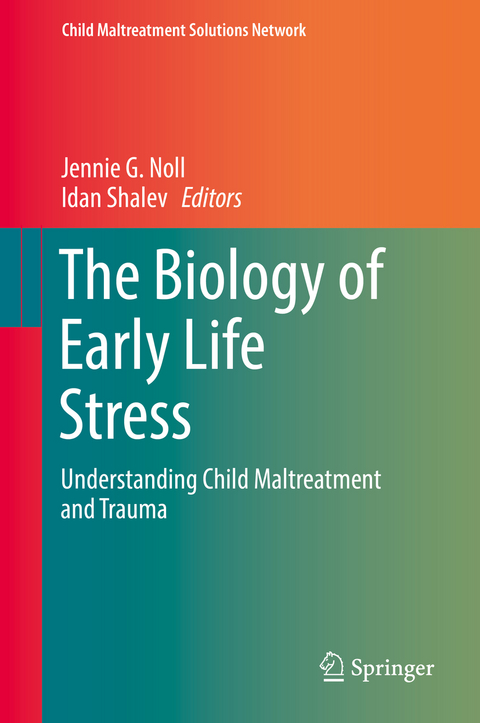
The Biology of Early Life Stress
Springer International Publishing (Verlag)
978-3-319-72588-8 (ISBN)
This innovative collection extends the emerging field of stress biology to examine the effects of a substantial source of early-life stress: child abuse and neglect. Research findings across endocrinology, immunology, neuroscience, and genomics supply new insights into the psychological variables associated with adversity in children and its outcomes. These compelling interdisciplinary data add to a promising model of biological mechanisms involved in individual resilience amid chronic maltreatment and other trauma. At the same time, these results also open out distinctive new possibilities for serving vulnerable children and youth, focusing on preventing, intervening in, and potentially even reversing the effects of chronic early trauma.
Included in the coverage:
- Biological embedding of child maltreatment
- Toward an adaptation-based approach to resilience
- Developmental traumatology: brain development and maltreated children with and without PTSD
- Childhood maltreatment and pediatric PTSD: abnormalities in threat neural circuitry
- An integrative temporal framework for psychological resilience
The Biology of Early Life Stress is important reading for child maltreatment researchers; clinical psychologists; educators in counseling, psychology, trauma, and nursing; physicians; and state- and federal-level policymakers. Advocates, child and youth practitioners, and clinicians in general will find it a compelling resource.
Jennie G. Noll, Ph.D., is the Ken Young Family Professor for Healthy Children, in the Department of Human Development and Family Studies at Penn State University. She is also the director of the Penn State's Child Maltreatment Solutions Network and the Principal Investigator of the NICHD P50 Translational Center for Child Maltreatment Studies. Over the past 25 years, Dr. Noll has been the PI on NIH-funded research grants aimed at (1) the long-term developmental and physical health consequences of childhood sexual abuse, (2) pathways to teen pregnancy and motherhood for maltreated adolescents, (3) the cyber-hygiene and social media behaviors of abused teens, and (4) reversibility of neurocognitive deficits in abused and stress-exposed populations. Results from Dr. Noll's work have been used to inform public policy recommendations for child abuse prevention and treatment as well as research priorities put forth by the Institute of Medicine and policy statements by the World Health Organization. As its Director, Dr. Noll supports the strategic goals of the Child Maltreatment Solutions Network; to raise the rigor of science, change trajectories for victims, mobilize public investment in prevention and treatment, and train and inspire the next generation of scientists, practitioners, and advocates who will coalesce to solve the complex issue of child maltreatment. Idan Shalev, Ph .D., is the Mark T. Greenberg Early Career Professor for the Study of Children's Health and Development and an Assistant Professor in the Department of Biobehavioral Health at Penn State University and a faculty member with the Child Maltreatment Solutions Network at Penn State University. Dr. Shalev's research entails an interdisciplinary approach to identify mechanisms underpinning the biological embedding of stress across the lifespan. His research combines the disciplines of molecular genetics, endocrinology, neurobiology and psychology. Specifically, his research tests the effects of stress from early life on change in telomere length and other biomarkers of aging across the life course, and the consequences of change in telomere system for physical and mental health problems. Dr. Shalev's current work explores temporal differences in gene expression and epigenetic changes in response to environmental stressors in the lab, as moderated by early life stress. His research aim to inform new targets for intervention studies to reverse the damaging effects of stress on our body and mind. He is the author of more than 40 scientific articles and chapters and serves on the editorial board of Telomere and Telomerase journal.
Biological Embedding of Child Maltreatment Through Inflammation.- Psychobiological Consequences of Child Maltreatment.- Toward an Adaptation-Based Approach to Resilience.- Developmental Traumatology: Brain Development and Maltreated Children With and Without PTSD.- Childhood Maltreatment and Pediatric PTSD: Abnormalities in Threat Neural Circuitry.- Pediatric Posttraumatic Stress.- Epigenetics and Early Life Adversity: Current Evidence and Considerations for Epigenetic Studies in the Context of Child Maltreatment.- An Integrative Temporal Framework for Psychological Resilience.- Conclusions and Panel Discussion.
| Erscheinungsdatum | 28.06.2018 |
|---|---|
| Reihe/Serie | Child Maltreatment Solutions Network |
| Zusatzinfo | XX, 162 p. 15 illus., 12 illus. in color. |
| Verlagsort | Cham |
| Sprache | englisch |
| Maße | 155 x 235 mm |
| Gewicht | 444 g |
| Themenwelt | Geisteswissenschaften ► Psychologie ► Entwicklungspsychologie |
| Medizin / Pharmazie ► Medizinische Fachgebiete ► Gynäkologie / Geburtshilfe | |
| Sozialwissenschaften ► Pädagogik | |
| Schlagworte | Biological embedding • Child coping • Childhood PTSD • Childhood stress • Child maltreatment • child mental health • Child Trauma • Coping • DNA Methylation • endocrinology • epigenetics • gene expression • Immune functioning • Lifetime stress • maternal and child health • Metabolic functioning • molecular genetics • Neurobiology • Resilience • Telomere length |
| ISBN-10 | 3-319-72588-2 / 3319725882 |
| ISBN-13 | 978-3-319-72588-8 / 9783319725888 |
| Zustand | Neuware |
| Haben Sie eine Frage zum Produkt? |
aus dem Bereich


